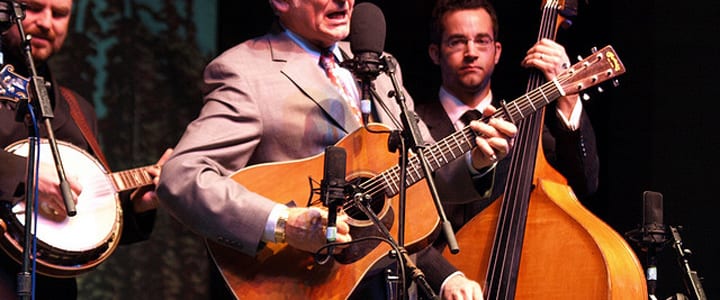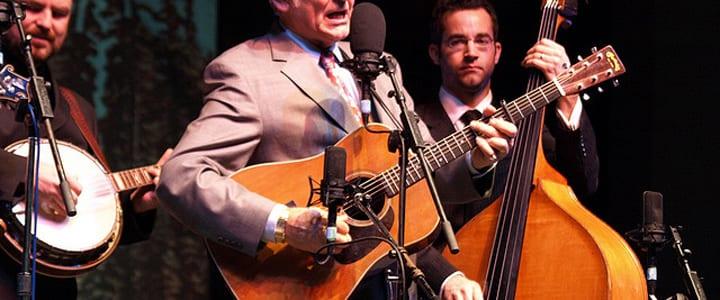 Want to master blisteringly fast bluegrass guitar picking? Guitar teacher Collin K. shares the essential fingerstyle techniques to practice to get you up to lightning speed!
Want to master blisteringly fast bluegrass guitar picking? Guitar teacher Collin K. shares the essential fingerstyle techniques to practice to get you up to lightning speed!
Ever thought of becoming a successful bluegrass guitarist like Doc Watson, Clarence White, or Lester Flatt? Well you can, and it’s easier than you think! Before beginning you will need a thumb pick, two finger picks, and preferably a metronome. If you don’t have a metronome, you can find a free internet plugin by using any search engine. By the end of this article you will be playing countless bluegrass songs on the guitar using a few common fingerstyle techniques!
From its roots in country and folk music, bluegrass is a genre that emphasizes ensemble playing. Because guitar players had to compete with the bassist, fiddler, and banjo player for loudness, they usually took to using a pick.
The two most common picking styles in bluegrass are fingerstyle and flat picking. Flat picking (regular old strumming) utilizes a standard guitar pick while fingerstyle relies on picks attached via rings to two or more of the player’s fingers. This article focuses on common fingerstyle techniques employed by bluegrass guitar players, but first we have to explore two main variations of fingerpicking.
Three-Finger Style
Otherwise known as the “Scruggs Style” after banjo player Earl Scruggs who first popularized it, this fingerstyle employs a thumb pick, index finger pick, and middle finger pick to pluck individual strings on the guitar. The advantage over other picking styles is the speed at which experienced players can play arpeggios and string skipping runs without breaking rhythm. This gives the guitar a very percussive, lively sound that lends itself well to an ensemble setting.
However, this isn’t to say that players using this technique can only play single-note runs. Many experiment with combining this style with strumming via thumb pick or either finger pick. As always, you are free to play whatever you like!
Three-finger style is versatile and popular but can be difficult for players with limited fingerstyle experience. When learning this style, try picking individual chord tones with a slow, consistent rhythm before speeding up as you are able. Using a metronome will greatly increase the effectiveness of these exercises because it will keep you honest! If you keep falling behind the beat, just turn it down and start slower. This kind of practice is the quickest way to become an amazing picker.
Three-Finger Style Techniques
Because many bluegrass fiddle tunes are in the key of C major, I have presented these exercises using C, F, and G chords to portray typical chord progressions. When you are learning how to play bluegrass guitar, it is wise to stick to a simple set of chords. It’s how you use them that matters.
Three-String Runs
The idea here is to use your thumb for the bass notes and your two fingers for the two high strings in each measure. If you pull it off, you can keep the rhythm strong with your thumb while filling out notes with your fingers. Try different chord tones to find the voicing that you like.

Four-String Runs
This exercise is almost identical the one above, except that the thumb is utilized not only for bass notes but also for a high string as well. Experienced bluegrass players learn to play in this style for the fastest of the fast songs. Make sure to start slow with that metronome!

Two-Finger Style
This variation of the Scruggs Style was favored by bluegrass guitar legend Lester Flatt. It omits the middle finger pick in favor of a simple thumb pick and index finger pick combination. Because of this simplicity, the two-finger style is easily adopted for purposes that resemble flat picking.
The main idea is to use the thumb to pluck individual bass notes while strumming with the index finger. This is great for playing loud chords in a driving manner and is often used to carry the main harmony of the song. In addition, this style can be used to simulate bass lines in the absence of a bass player.
But just like with Scrugg’s style, you are free to explore and find more ways to utilize this approach to playing bluegrass guitar. Here are some exercises I would recommend to become acquainted with the two-finger style. And don’t forget your metronome!
Two-Finger Style Techniques
Again, these figures are portrayed in C major for simplicity but you are not stuck here. Playing around with different chords will give you a better idea of what you and your guitar are capable of.
Pluck-and-Strum
This exercise is all about getting you acquainted with the capabilities of two-finger style. Specifically, it is about using your thumb to pluck the bass note of each chord before strumming two full chords with your index figure. Bluegrass ballads often call for this type of guitar arrangement.

Fast Strum
Now we’re getting to the fun part. Some bluegrass tunes are played at extremely fast tempos, and by speeding up the pluck-and-strum you just may manage to keep up. The key here is to play the chords almost as if you were flat picking with a normal guitar pick. The difference is that you can still use your thumb for the bass in two-finger style, but you will still most likely resort to strumming both up and down with your index finger. There’s no diagram for this one – find a fast bluegrass song to play along to and try to keep up! (I usually use the song “Wait So Long” by Trampled By Turtles when I teach).
Keep Practicing
Some of these techniques may seem tricky at first, but don’t be discouraged. Practice at least ten minutes a day for two weeks and you’ll be seeing some serious improvement! No bluegrass guitarist ever became great overnight, and with these common fingerstyle techniques you now have a roadmap for how to get there.
Learn how to play bluegrass guitar and more by studying with a private guitar teacher. Guitar teachers are available to work with you online via Skype or in-person, depending on your location and availability. Search for your guitar teacher now!

Collin K. teaches in-person guitar and singing lessons in Brooklyn, N.Y. He studied Music Technology at New York University, plays in an instrumental rock band, and writes music for films. Learn more about Collin here!
Photo by Eric Frommer
Suzy S.

